You poor guys, here's more. I'm having fun. Unfortunately, the video of the intercooler didn't turn out well, but it's very cool to see the temp drop as the air moves across it.
Heat shield effectiveness. The dark areas closest to the camera are at basically ambient temp (94F according to the camera). This is a view of the turbo system from the driver's fender. You can see the air filter (bottom left) and brake fluid reservoir (lower right) and how well they're protected from heat. This is shortly after a dyno run, with lots of heat soak. You can also see the heat coming off the back of the radiator.
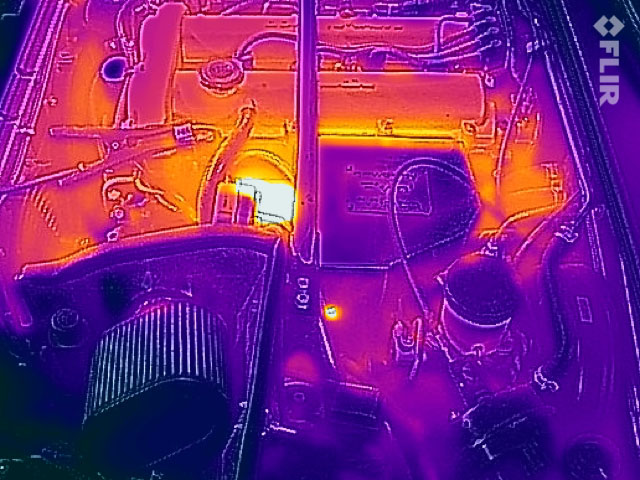
Here's another from the front of the car along with a blurry visible light shot. Again, we see the cool filter and brake parts. What's also interesting is how cool the intake manifold and the pipe running into it are - that's the result of the intercooler. Again, this is about 30 seconds after a dyno run.
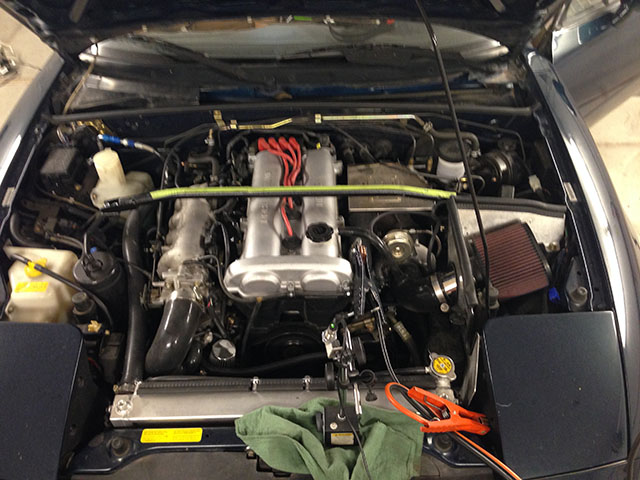
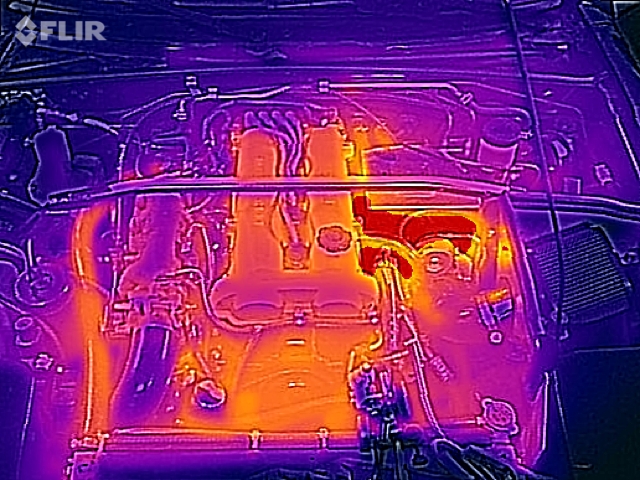
I could have fun in the boiler house w/ that.

cwh
PowerDork
7/8/16 6:33 p.m.
They are very effective for surveillance use, can spot a body in total darkness. Resolution is not very good, but you know what is out there.

kb58
Dork
7/8/16 7:12 p.m.
Be careful where you point that thing. We played with one costing 7-digits - no kidding - and they're insanely sensitive. Walk across the floor and your thermal foot prints will stay there for many seconds. About that time the boss walked in and noticed he was on-camera, then quipped, "Just call me 'Stumpy'".
I'd love to see the Flir video of various intercooler cores under load. Ok, I have already seen something like that before but it's always fun to watch.
In reply to cwh:
I'm curious what the resolution on these actually is. I found a Flir cut sheet that said 640 x 480, which is incredibly high. To put that in perspective, that would double the resolution of their $9k imager. I also found info stating is was 160 x 120, which sounds more reasonable but still equals their $2500 units. Most sub $1000 imagers are 80 x 80 or less. Each pixel is it's own IR temp gun, so a 160 x 120 would give you 19,200 temperature references in one pic.
In reply to Boost_Crazy:
According to Amazon, these are 80x60 pixels. Looks like there's a similarly priced phone attachment one called the Seek that's 206x156 and has a wider temp range. Only downside is that it lacks the visible light camera of the one Keith got.

Kylini
HalfDork
7/8/16 7:49 p.m.
Some newer cars are coming with FLIR cameras built-in as "night vision". My S6 has one -- resolution is supposedly 320x200. Unfortunately it's bolted to an Audi, so it's kind of hard to point it into a Miata engine bay. :)
I'm hoping they come out with a Verizon compatible version of this thing: Cat S60 Phone
A waterproof phone with a built in thermal camera could definitely be a fun thing to have.
stuart in mn wrote:
Non-car use: take a look at the circuit breaker panel in your house, to make sure there are no poor connections heating up.
We actually pay a company to come through the facility I work at and audit all of our 240v and 480v panels once a year with a gun in the $10k range. They have found a hotspot every year since they started coming in. It's crazy how fast the connections will degrade; more resistance makes more heat which makes more resistance and so on. Very real fire hazards that were completely unknown to us.
Burrito wrote:
stuart in mn wrote:
Non-car use: take a look at the circuit breaker panel in your house, to make sure there are no poor connections heating up.
We actually pay a company to come through the facility I work at and audit all of our 240v and 480v panels once a year with a gun in the $10k range. They have found a hotspot every year since they started coming in. It's crazy how fast the connections will degrade; more resistance makes more heat which makes more resistance and so on. Very real fire hazards that were completely unknown to us.
The last department I worked in had a Fluke brand IR camera that worked very well- we used it for the same thing during PMs.
It more than paid for itself by identifying problems before equipment blew up.
crankwalk wrote:
I'd love to see the Flir video of various intercooler cores under load. Ok, I have already seen something like that before but it's always fun to watch.
I don't have a selection of cores available, unfortunately. But even a single design is neat to see. I wish we'd had this thing when we were testing radiators, that's would have been excellent.
They are also great for finding water intrusion/ damage. You can find leaks even after they have "dried up", as the wood and dry wall still retain more moisture and it shows up on the camera.
The core camera chip in things like the FLIR One is like, $150 retail. $250 seems like a fair price for a turnkey solution.
Burrito wrote:
stuart in mn wrote:
Non-car use: take a look at the circuit breaker panel in your house, to make sure there are no poor connections heating up.
We actually pay a company to come through the facility I work at and audit all of our 240v and 480v panels once a year with a gun in the $10k range. They have found a hotspot every year since they started coming in. It's crazy how fast the connections will degrade; more resistance makes more heat which makes more resistance and so on. Very real fire hazards that were completely unknown to us.
I have done that for people as well.
dculberson wrote:
On sale on Amazon today for $179. I'm thinking about one.
https://smile.amazon.com/FLIR-ONE-Thermal-Imager-iOS/dp/B00VILVV62/
Awesome! I missed that deal a few weeks ago. Just ordered it.
Ha! This whole thing was a marketing tactic and I'm making big money from Amazon referrals!
Alas, no. But killer deal.

Be careful with thermal imagers - it's easy to fool yourself. Make sure you understand emissivity, and watch out for reflections. There are lots of thermally-reflective surfaces in cars, and lots of hot and cold sources.
Emissivity can be measured with an imager, but I haven't handled a FLIR One enough to say how to do it with one. It helps if you put something of known emissivity on the surface you want to check - they make special stickers, or you can use electrical tape if the temperature isn't too high.
Somewhere I've got some nice images of a teakettle that appears to be at room temperature - while it's whistling!.
Here's a nice radiator shot. You can see the water pump to the left of the V emblem. Notice the dark areas on the emblem and the bumper tops. Those are reflections of the sky.
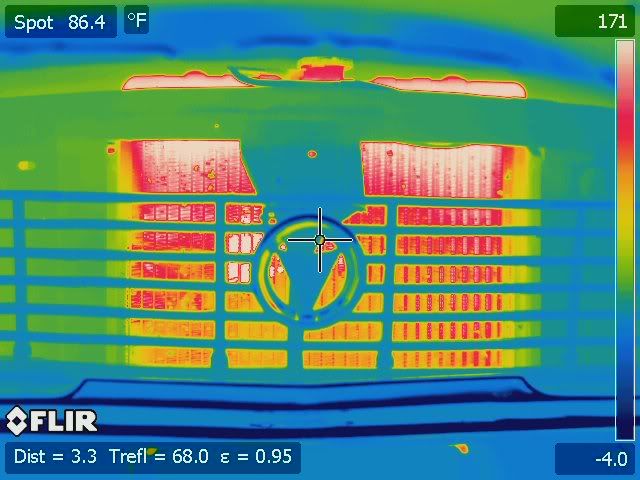
(Shot with a FLIR P640)
and a manifold shot (225 Slant Six, warming up):
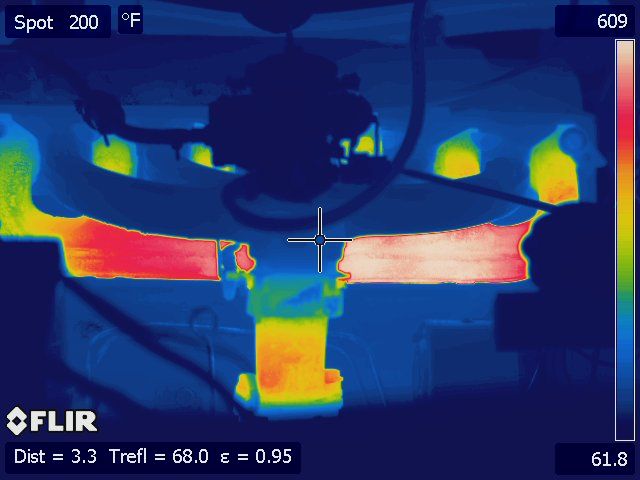
Having spent a lot of time working imagers without it, I'm not much on using the photo fusion (That's what gives you the edges) for my work. It has its place, though.
We would use these on locomotives all of the time. You could tell the fuel injector efficiency at a quick glance.
For the non-PG uses, I worked for a company that made the same ones the border patrol use for surveillance. We were having a slow convention in Vegas and we has one of the smaller ones as a demo unit. It made for some interesting bets just couldn't get caught.
Oh man, thanks for the heads up on the Amazon sale. Just ordered one for work. 
Keith Tanner wrote:
So, what good car-related uses can you come up with? What good frivolous uses?
I'd look at A/C condensors to see if I could tell where the gas is condensing to liquid. This is both automotive related and frivolous 














































